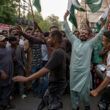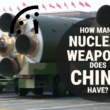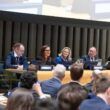The winding path to Helsinki
By Ayman Khalil |
In the fall of 2011, everything seemed to be in place to convene a 2012 conference on establishing a WMD-free zone in the Middle East. The meeting was to be sponsored by the United Nations as well as by the United States, Russia, and the United Kingdom. Finland had emerged as host country for the conference, which was envisioned for December 2012. UN Secretary-General Ban Ki-Moon named Finnish Ambassador Jaakko Laajava as facilitator of the process. The long delay in naming a facilitator was due to an extensive consultation process — but perhaps also to political transformations in many Middle Eastern countries. In any event, with Laajava's appointment the path toward a conference seemed relatively clear. But in the months that followed, no meeting agenda was announced. The precise date of the conference was not set.
A strong indication that the conference might not occur in 2012 emerged in September of last year when the head of Israel's Atomic Energy Commission made clear in a statement to the International Atomic Energy Agency (IAEA) that Israel would not attend. Israel is the only nuclear-armed country in the region, and the only Middle Eastern nation that has not joined the Nuclear Non-Proliferation Treaty (NPT); without Israel's participation, the relevance of the conference would obviously be diminished. But official notice that the conference would not occur only came in December, with a statement from the US State Department. The statement was very puzzling, not making it entirely clear whether the conference was to be postponed or simply cancelled. And because the statement spoke of a "deep conceptual gap persisting in the region," wording that bore similarities to earlier statements by Israeli officials, some analysts concluded that the meeting had been cancelled in order to preserve Israeli interests.
The unilateral nature of the statement also seemed to reveal that little coordination existed among the conference's sponsors — an impression intensified when other sponsors subsequently issued contradictory statements (Russia, for example, said that the December conference should not have been postponed without the parties' having agreed to a new date). An alarming lack of coordination between the sponsors and the facilitator was also revealed. Laajava's office issued a single statement after the meeting was suspended and otherwise maintained a deathly silence, giving little indication that the facilitator's mission was ongoing.
Still, the process toward establishing a WMD-free zone has not entirely collapsed. Indeed, the term "process" is used because the idea behind the planned conference was to create an ongoing initiative to establish a zone in the Middle East free from all WMD. A single meeting was never the point.
The facilitator's mandate runs in principle until 2015, when he is expected to submit his final conclusions to the NPT Review Conference. And according to a statement that Ambassador Laajava made in April at the preparatory committee meeting for the 2015 Review Conference, he is still committed to pursuing quiet, shuttle diplomacy. Still, Laajava has conducted more than 300 discussions with regional and international parties regarding the WMD-free zone, and all those consultations have not yet produced any tangible results.
The failure to organize the Helsinki conference represents a serious setback for nonproliferation efforts in the region — partly because, amid the Arab Spring, decision makers are under pressure to demonstrate to their citizens that Arab diplomacy will be passive no longer. Egypt walked out of the 2013 preparatory committee meeting for the 2015 Review Conference, and other states may take similar steps in the future. Already there is talk in the Arab world about reconsidering the indefinite extension of the NPT.
What can be done. Ambassador Laajava, of course, is not solely responsible for the failure of the conference. That is the combined responsibility of the facilitator, the conveners, states in the region, and multilateral bodies.
A few months ago, the Arab Institute for Security Studies was involved in producing a study that highlighted the role that civil society and multilateral organizations might play in the Helsinki process. The IAEA, the Organisation for the Prohibition of Chemical Weapons, and other multilateral entities could all play important roles. Nongovernmental organizations might be able to shape public opinion and influence governments — notably Israel's government. Indeed, if the deadlock is to be resolved, Israel must commit itself to the process. But for that to happen, decision makers in Tel Aviv must come to understand that possessing nuclear weapons is not the way to ensure their country's survival.














